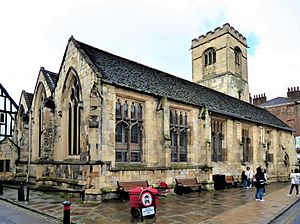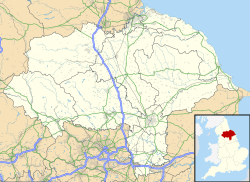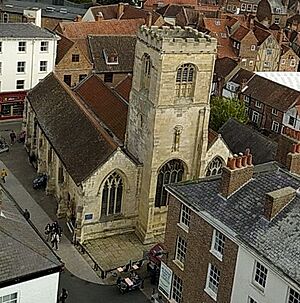St Sampson's Church, York facts for kids
Quick facts for kids St Sampson's Church |
|
|---|---|

St Sampson's Church, seen from Church Street
|
|
| 53°57′35″N 1°04′53″W / 53.95972°N 1.08125°W | |
| OS grid reference | SE 60386 51911 |
| Location | Church street, York |
| Country | England |
| Denomination | Church of England |
| Previous denomination | Roman Catholic |
| Website | stsampsonscentre.co.uk |
| History | |
| Former name(s) | Church of St Sampson, Girdlergate |
| Status | Parish church |
| Architecture | |
| Functional status | Community centre |
| Heritage designation | Grade II listed |
| Designated | 14 June 1954 |
| Architect(s) | Frederick Bell |
| Architectural type | Parish church |
| Style | Gothic |
| Years built | 1845–1848 |
| Groundbreaking | Early 12th century |
| Completed | 1480s |
| Closed | 1969 |
| Specifications | |
| Number of towers | 1 |
| Bells | 2 |
St Sampson's Church is a historic building in the city of York, England. It used to be a church but is now a community centre. You can find it on Church Street, close to St Sampson's Square.
Contents
St Sampson's Church: A Journey Through Time
St Sampson's Church has a long and interesting history. It stands on what used to be the wall of the ancient Roman city of Eboracum (which is what York was called back then).
Early Beginnings: Before the Normans
The very first church on this spot was likely built before the Norman Conquest in 1066. We know this because a piece of an old cross from the early 11th century was found nearby. Also, parts of a Norman wall have been discovered under the current church building. The church was first officially mentioned in records in 1154. It is special because it's the only church in England named after Saint Sampson of York.
Rebuilding and Changes: The Medieval Era
Over the years, the church was rebuilt many times. In the 15th century, different parts were updated:
- The south aisle (a side section) was rebuilt in the 1400s.
- The north aisle was built in the 1440s.
- The west tower was rebuilt in the 1480s.
In 1549, there was a plan to combine this church's area with another church, St Helen, Stonegate. Even though this didn't happen, St Sampson's did get two bells from St Helen's.
Damage and Repair: The English Civil War
In 1644, during the English Civil War, the church's tower was damaged. Soldiers from the Parliamentarian side also destroyed many of the old monuments inside the church.
Victorian Updates: A New Look
Between 1845 and 1848, most of the church was rebuilt by an architect named Frederick Bell. He kept the Gothic style, which was popular in medieval times, but added a new room called a vestry. Because of this big renovation, the church looks more Victorian than medieval today.
The original tower survived the Victorian rebuild, but its height was changed. It was made shorter, then made taller again in 1910. Some parts of the church that are still from before the Victorian changes include:
- The east window of the north aisle.
- Some decorative carvings on the roof (called roof bosses).
- The frame that holds the bells, and the bells themselves.
- The north and south doors.
- A special basin called a piscina.
- Various old monuments.
From Church to Community Centre
In 1969, St Sampson's Church closed its doors as a place of worship. Many of its old fittings and decorations were removed. However, it was later restored by George Pace, a famous architect. In 1974, it reopened as a centre for older people.
During this restoration, George Pace made some clever changes:
- He added a mezzanine floor (a half-floor) over the north aisle to create space for offices.
- He put a kitchen in the south aisle.
- The sanctuary (the most sacred part of the church) was turned into a chapel, using a special screen (reredos) from another church.
Protecting History: Listed Building Status
Because of its historical importance, St Sampson's Church was given a "Grade II listed" status in June 1954. This means it's a special building that needs to be protected.
 | Emma Amos |
 | Edward Mitchell Bannister |
 | Larry D. Alexander |
 | Ernie Barnes |



